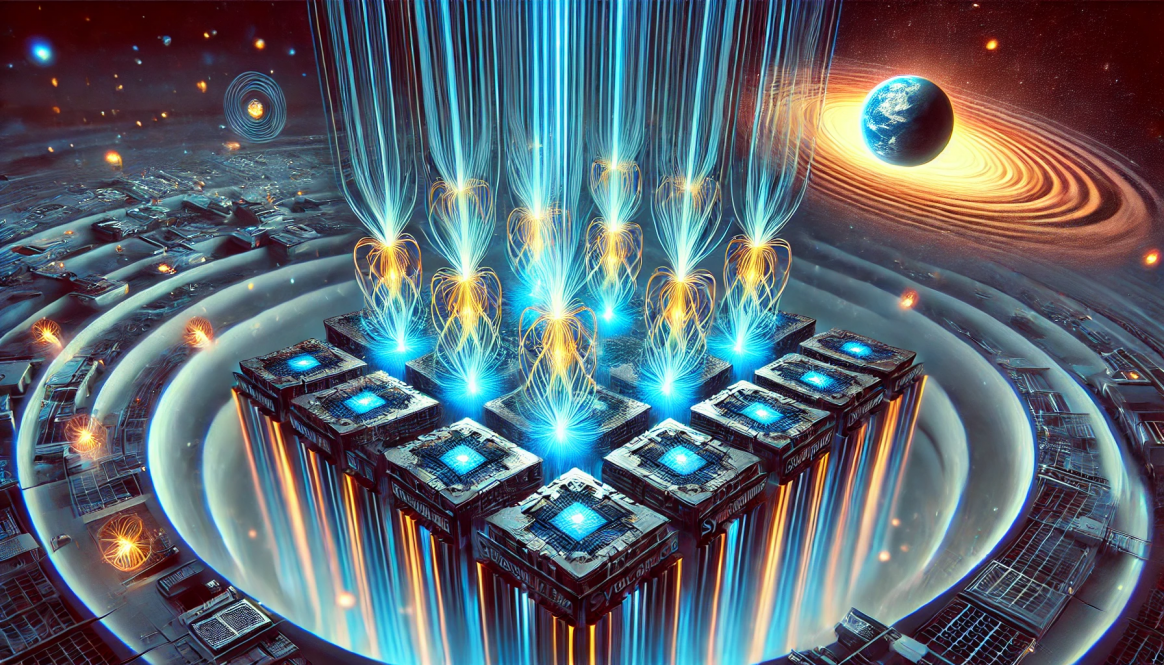UConn physicists have partnered with Google Quantum AI and Nordic Institute for Theoretical Physics (NORDITA) quantum experts on a groundbreaking paper on the effects of gravitation on quantum information systems.
Physics Prof. Alexander Balatsky of the UConn Quantum Initiative developed the paper with Pedram Roushan, Google’s project leader on qubits in the artificial intelligence division on quantum computing and simulation. UConn and NORDITA post-doctoral fellow Patrick Wong and NORDITA’s Joris Schaltegger were also co-authors and researchers on the paper, which was published on Jan. 7.
The researchers demonstrated that classical gravitation has a non-trivial influence on computing hardware. They investigated the interaction of qubits – basic units of quantum information – with a classical gravitational field.
The findings could prove impactful to quantum technology, a field in which UConn has established as a research priority with potential transformative implications for the state.
“We live in the era of global technology race to universal quantum computation,” Balatsky says. “Our research reveals that the same finely tuned qubits engineered to process information can serve as precise sensors—so sensitive, in fact, that future quantum chips may double as practical gravity sensors. This approach is opening a new frontier in quantum technology.”
The team wrote a manuscript of the findings that has been accepted for publication in Physical Review, a respected peer-reviewed journal. The paper is entitled “Quantum Sensing from Gravity as Universal Dephasing Channel for Qubits.”
Gravitation is a fundamental force of nature which is ever present in the universe. However, it is extremely weak and is generally disregarded when analyzing quantum systems situated near the surface of Earth. Although relatively small, the effects of gravitation are still present.
For qubits, the effect of gravitation is to slightly detune the energy levels between its 0 and 1 states depending on its height in the gravitational field, Wong explains. On a single qubit basis, this effect is essentially irrelevant as it simply rescales the energy level.
Team research shows that a qubit can produce nontrivial effects when considering an ensemble of many qubits at different heights, such as on a quantum computing chip which vertically aligned, such as in the case for the Google Sycamore chip.
The work quantifies the effect that gravitation has on quantum information systems, such as the qubits of a quantum computer. Gravitation leads to a novel dephasing channel for qubits, which can then be error corrected or read out for use as a sensor. Although the magnitude of this effect is negligible for current technology, the effect scales with the physical size of the system and the number of qubits involved.
“Gravitation is an effect which cannot be naturally shielded against, in contrast to external electromagnetic radiation,” says Wong. “As quantum technology advances in complexity of its devices, the effect which may prove impactful in quantum technologies down the road.”
The team envisions special-purpose qubit chip designs whose optimized layouts dramatically enhance gravitational sensing capabilities, an advance that could ultimately enable GPS-free navigation.
UConn has emerged as a leader in research and applications for quantum technology with significant focus on applications such as quantum sensing. Faculty members and students are conducting numerous projects throughout the University and in partnership with leading Connecticut companies and governmental offices.
QuantumCT exemplifies UConn’s commitment to the transformative capability of quantum science. Yale University is co-lead on the initiative that includes dozens of partners across Connecticut, with the goal of making the state the nation’s lead quantum accelerator.
The National Science Foundation has named QuantumCT a finalist for potentially billions in grant funding through its Engines Development program. The initiative is already funding many projects across the state.
UConn has also begun an important partnership with the renowned Los Alamos National Laboratory (LANL). Scientists and engineers from the LANL visited UConn in November for a workshop exploring where their respective research priorities intersect. Quantum technology was one of the main topics of the workshop, which Balatsky organized in consultation with the OVPR.
“Quantum technologies multiply across diverse fields and quantum sensing stands out as a near-term, practical application,” Balatsky says. “We hope UConn and QuantumCT will help to create a virtuous cycle—one where new uses feed innovation, and innovation expands possibility—ultimately affirming quantum as a transformative force shaping the future quantum industry at Connecticut and nationwide.”



